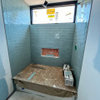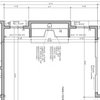New'ish' home massive water intrusion.
riddei
16 years ago
Related Stories

GREAT HOME PROJECTSHow to Switch to a Tankless Water Heater
New project for a new year: Swap your conventional heater for an energy-saving model — and don’t be fooled by misinformation
Full Story
GREEN BUILDINGHow to Harvest Rainwater for Your Garden
Conserve a vital resource and save money by collecting stormwater for irrigation in a barrel or tank
Full Story
SAVING WATERIs a Rainwater Cistern Right for You?
These extra-large containers reduce runoff and save on the use of potable water for the landscape
Full Story
LANDSCAPE DESIGNCalifornia Says Goodbye to the Sprawling Ornamental Lawn
New state rules will effectively limit turfgrass to 25 percent of the landscape in most new and renovated yards
Full Story
GARDENING AND LANDSCAPINGOutdoor Fountains Bring the River to You
Chill out with a custom or kit water feature for your patio or yard — there's even one for a furry friend
Full Story
GARDENING GUIDES7 Ecofriendly Gardening Ideas That Also Cut Chore Time
Spend less time weeding, less money watering and more moments just sitting back and enjoying your healthy garden
Full Story
HOMES AROUND THE WORLDHouzz Tour: A Home Made to Look ‘Smashed, Bashed and Broken’
In a beautiful, secluded New Zealand valley, a vacation house buit from reclaimed materials pays homage to traditional agrarian structures
Full Story
HOUZZ TOURSHouzz Tour: Family Matters in a Barn-Turned-Guesthouse
Kids and grandkids always have a place to stay (and play) in this ecofriendly guesthouse in the California hills
Full Story
REMODELING GUIDES10 Things to Do Before the Renovation Begins
Prep and plan with this insight in hand to make your home remodeling project run more smoothly
Full Story
REMODELING GUIDESThe Case for Waiting to Remodel
We know, you're excited to make your home match your vision. But your vision may change once you've lived there awhile
Full StorySponsored
More Discussions









pinktoes
carolyn53562
Related Professionals
Bull Run Architects & Building Designers · Franklin Architects & Building Designers · Ken Caryl Architects & Building Designers · South Pasadena Architects & Building Designers · Universal City Architects & Building Designers · Mililani Town Design-Build Firms · California Home Builders · Forest Hill Home Builders · South Sioux City Home Builders · Kearns Home Builders · El Sobrante General Contractors · Mountain View General Contractors · Olney General Contractors · Signal Hill General Contractors · View Park-Windsor Hills General Contractorscarolyn53562
sue36
cookingpassion
worthy
worthy
SuzieSnowflake
riddeiOriginal Author
gardenchick1
sue36
riddeiOriginal Author
riddeiOriginal Author
carolyn53562
cookingpassion
sue36
riddeiOriginal Author
riddeiOriginal Author
vhehn
riddeiOriginal Author
rollie
gardenchick1
chiefneil